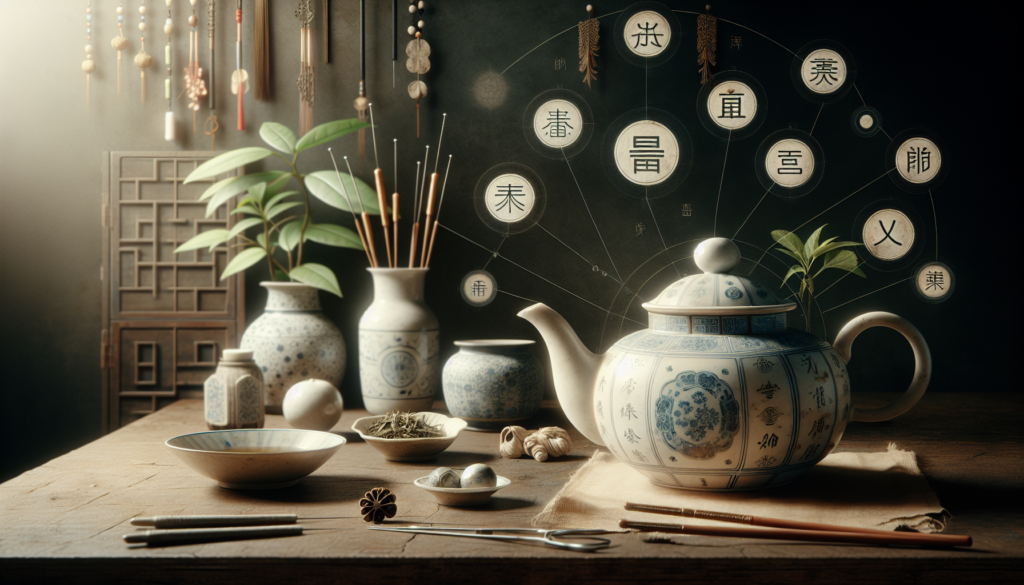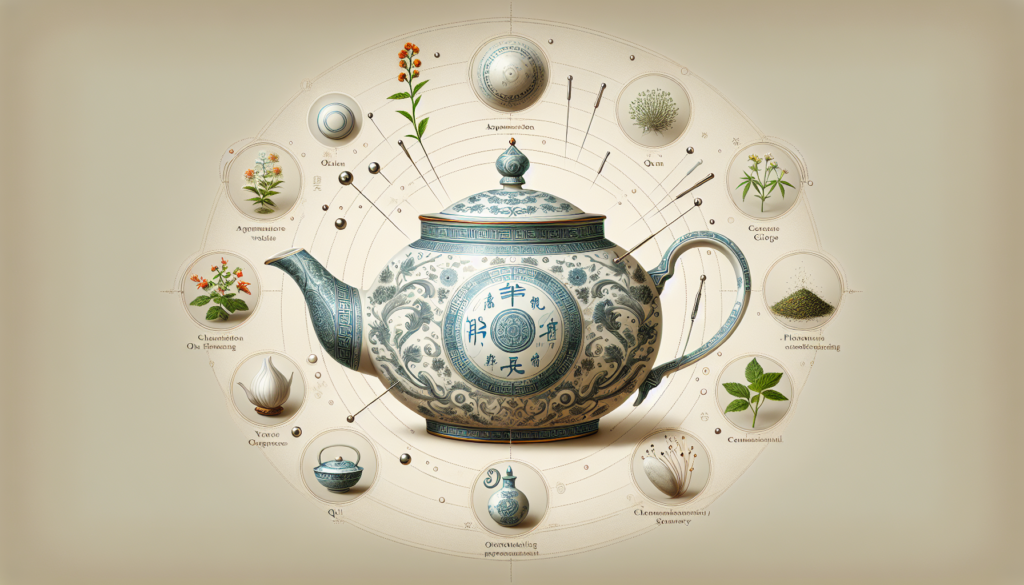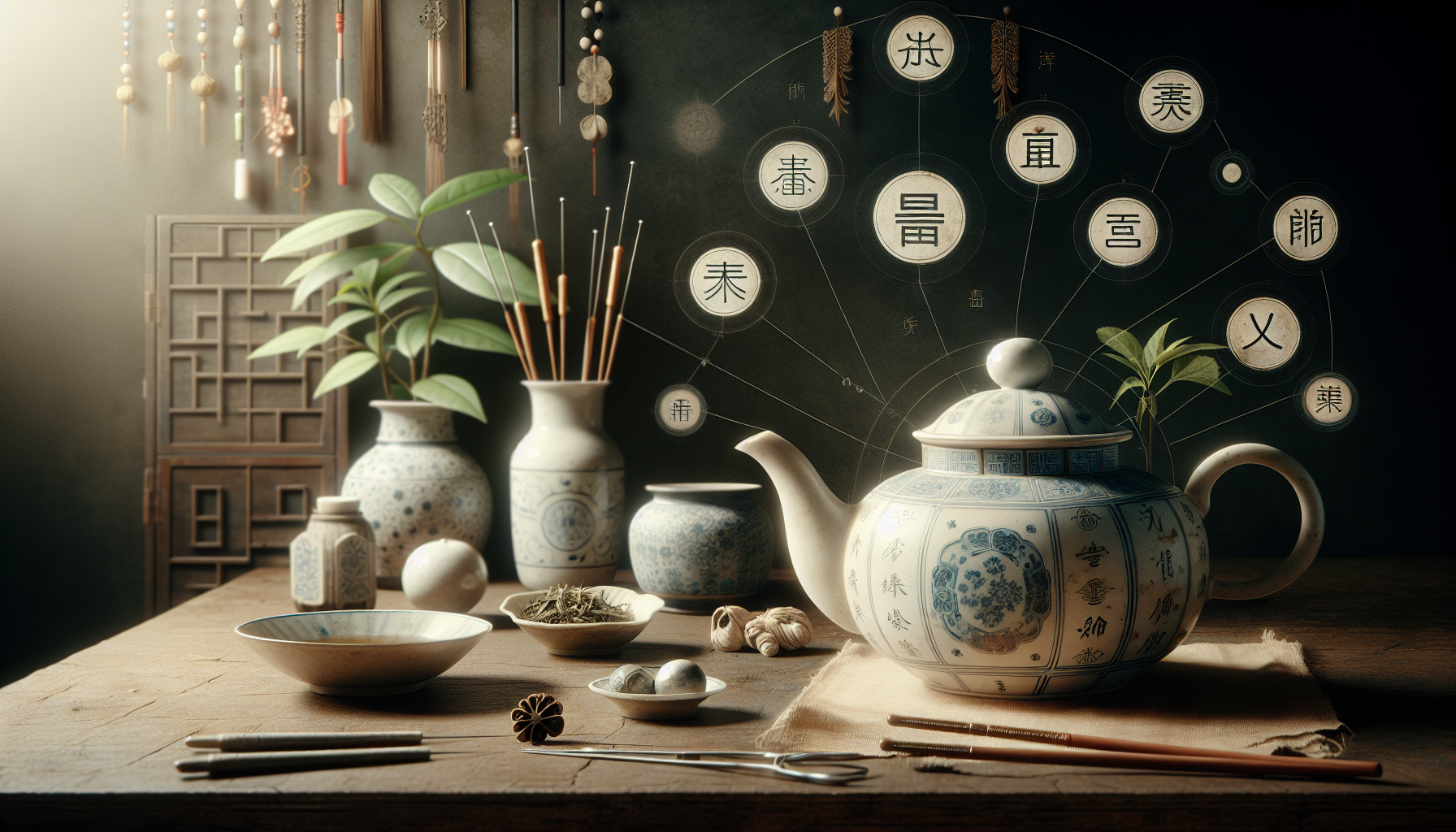Have you ever been curious about Traditional Chinese Medicine (TCM) and how it can benefit your overall well-being? With its rich history spanning thousands of years, TCM offers a holistic approach to health that focuses on restoring harmony and balance within the body. From acupuncture and herbal remedies to tai chi and qigong, there are numerous ways you can incorporate TCM into your daily life to enhance your physical, mental, and emotional well-being. This article will explore some simple yet effective ways you can begin incorporating TCM practices into your life and start reaping the benefits they have to offer. So, what are you waiting for? Let’s delve into the world of TCM and discover how it can transform your life for the better.
Understanding Traditional Chinese Medicine
Definition of Traditional Chinese Medicine
Traditional Chinese Medicine (TCM) is a holistic approach to healthcare that has been practiced for centuries in China and other parts of the world. It encompasses a range of practices and treatments aimed at promoting balance and harmonizing the body, mind, and spirit. TCM views the body as a dynamic system where all aspects are interconnected, and imbalances or blockages can lead to disease. The foundation of TCM lies in the principles of Yin and Yang, the five elements, and the flow of vital energy known as Qi. By understanding and addressing these principles, TCM aims to restore and maintain overall health and well-being.
Principles of Traditional Chinese Medicine
TCM is guided by several key principles that distinguish it from Western medicine. These principles include Yin and Yang, the five elements, and Qi. Yin and Yang are opposite but complementary forces that exist in everything in the universe, including the human body. In TCM, health is achieved by maintaining the balance between Yin and Yang. The five elements – wood, fire, earth, metal, and water – represent different aspects of the body and are interconnected through a cycle of creation and control. Understanding the relationships between the elements is vital in diagnosing and treating imbalances. Qi, often translated as vital energy, circulates throughout the body along meridians or pathways. The flow of Qi is essential for maintaining health, and disruptions in its flow can lead to illness. TCM aims to restore the flow of Qi and promote overall balance in the body.
Common Practices in Traditional Chinese Medicine
Acupuncture
Acupuncture is one of the most well-known practices in TCM. It involves the insertion of thin needles into specific points on the body, known as acupuncture points. These points are believed to correspond to the meridians through which Qi flows. By stimulating these points, acupuncturists aim to restore the balance of Qi and promote healing. Acupuncture is commonly used to alleviate pain, reduce inflammation, and improve the body’s natural healing processes.
Herbal Medicine
Herbal medicine is another integral part of TCM. It involves the use of various plants, minerals, and animal products to create individualized herbal formulas. Each herb possesses specific properties and is selected based on a person’s unique needs and imbalances. Herbal medicine aims to restore harmony within the body and address specific health concerns. These formulas can be taken as teas, powders, pills, or topical applications, depending on the desired outcome.
Cupping Therapy
Cupping therapy involves the use of glass or plastic cups that are placed on the skin using suction. The vacuum created by the cups helps to increase blood flow, release muscle tension, and promote the flow of Qi. Cupping therapy is commonly used to treat pain, respiratory conditions, and to promote relaxation. It can leave temporary marks on the skin, resembling circular bruises, but these typically fade within a few days.
Tai Chi
Tai Chi is an ancient Chinese martial art that is commonly practiced for its health benefits. It consists of slow, flowing movements combined with deep breathing and mindfulness. Tai Chi promotes balance, flexibility, and relaxation while also improving mental clarity and focus. It is often recommended for reducing stress, improving posture, and enhancing overall well-being.
Qi Gong
Qi Gong is a practice that combines gentle movements, breathing exercises, and meditation to cultivate and balance Qi. There are countless forms and variations of Qi Gong, but the underlying goal is to harmonize Qi within the body. Regular practice of Qi Gong can improve energy levels, reduce stress, and promote emotional well-being.

Benefits of Traditional Chinese Medicine
Promotes overall health and vitality
One of the key benefits of TCM is its focus on promoting overall health and vitality. By addressing imbalances and restoring the flow of Qi, TCM treatments aim to optimize the body’s natural healing processes. This comprehensive approach can help maintain good health, prevent diseases, and slow the aging process.
Balances Yin and Yang
TCM emphasizes the importance of achieving and maintaining balance between Yin and Yang. This balance is essential for all bodily functions and overall well-being. By addressing imbalances between these opposing forces, TCM treatments can restore harmony and promote optimal health.
Supports natural healing processes
TCM recognizes the body’s innate ability to heal itself. TCM treatments aim to support and enhance these natural healing processes by addressing the root causes of health issues rather than just alleviating symptoms. By restoring balance and promoting the flow of Qi, TCM can help the body heal more effectively.
Reduces stress and anxiety
Stress and anxiety can have a significant impact on both physical and mental health. TCM offers various techniques, such as acupuncture, Tai Chi, and Qi Gong, that can help reduce stress and promote relaxation. These practices can stimulate the release of endorphins, improve blood circulation, and calm the mind, leading to a greater sense of calm and well-being.
Improves sleep quality
Many people struggle with sleep-related issues, such as insomnia or poor sleep quality. TCM offers effective approaches to improve sleep by addressing the underlying imbalances that may disrupt sleep patterns. Acupuncture, herbal remedies, and relaxation techniques can help regulate sleep cycles, calm the mind, and promote restful sleep.
Finding a Qualified Practitioner
Certifications and credentials to look for
When seeking a TCM practitioner, it is essential to find a qualified and licensed professional. Look for certifications from recognized institutions, such as the National Certification Commission for Acupuncture and Oriental Medicine (NCCAOM) in the United States. The practitioner should have completed the necessary education and training to ensure their expertise in TCM.
Researching and selecting a reputable practitioner
Researching and selecting a reputable TCM practitioner is a crucial step in receiving safe and effective treatment. Seek recommendations from trusted sources, such as friends, family, or healthcare providers. It is also helpful to read reviews and testimonials from previous patients. Consider the practitioner’s experience, specialization, and treatment approaches to ensure they align with your needs and preferences.
Consultation and treatment process
During the initial consultation, a TCM practitioner will assess your overall health, medical history, and specific concerns. They may ask detailed questions about your symptoms, lifestyle, and emotions to develop a comprehensive understanding of your health.
After the consultation, the practitioner will create a personalized treatment plan tailored to your individual needs. This plan may include acupuncture sessions, herbal remedies, dietary recommendations, and lifestyle modifications. Treatment sessions will involve the selected modalities, such as acupuncture or herbal medicine, and may require multiple visits for optimal results.

Incorporating Traditional Chinese Medicine into Daily Routine
Identifying health goals and concerns
To incorporate TCM into your daily routine, start by identifying your health goals and concerns. Reflect on your physical, emotional, and mental well-being and prioritize areas that need attention. Whether you are seeking relief from chronic pain, stress reduction, or overall wellness, understanding your goals will help you tailor the TCM practices that best suit your needs.
Developing a personalized treatment plan
Work with a qualified TCM practitioner to develop a personalized treatment plan. This plan should consider your specific health goals, preferences, and lifestyle factors. It may include acupuncture sessions, herbal remedies, dietary recommendations, exercises, and self-care practices.
Implementing TCM practices into daily life
Incorporating TCM practices into your daily routine requires commitment and consistency. Follow the recommendations provided by your practitioner, such as taking herbal remedies as prescribed, practicing Qi Gong or Tai Chi regularly, and implementing dietary changes. Find a balance that works for you and integrate these practices into your daily life gradually.
Maintaining consistency and commitment
Consistency is key when incorporating TCM into your daily routine. Many TCM practices, such as acupuncture, herbal remedies, and exercises, require regular and sustained engagement to achieve optimal results. Prioritize your health goals and make a commitment to follow through with the recommended treatments and lifestyle changes.
Dietary Considerations in Traditional Chinese Medicine
Balancing the five elements in your diet
In TCM, diet plays a vital role in maintaining health and preventing imbalances. The five elements – wood, fire, earth, metal, and water – can be reflected in the foods we eat. Balancing these elements in your diet is essential for harmonizing your body. Incorporate a variety of foods from each element, such as leafy greens (wood), roasted vegetables (fire), whole grains (earth), white beans (metal), and seaweed (water).
Emphasizing whole foods and natural ingredients
In TCM, whole foods and natural ingredients are highly valued for their nourishing properties. Opt for fresh, unprocessed foods whenever possible. Choose locally sourced, organic produce, lean proteins, and healthy fats. Avoid foods that are heavily processed, high in refined sugars, or loaded with artificial additives.
Avoiding excesses and imbalances
TCM emphasizes moderation and balance in dietary choices. Overindulging in certain foods or consuming them in excess can lead to imbalances within the body. For example, excessive consumption of greasy or spicy foods can disrupt digestion, while consuming too many cold foods can weaken the digestive fire. Be mindful of your portion sizes and avoid extreme dietary habits.
Incorporating seasonal ingredients
TCM recognizes the importance of eating with the seasons. Different seasons have their own energy, and consuming foods that align with these energies can support overall health. Pay attention to the seasonal availability of fruits, vegetables, and herbs, and incorporate them into your meals. Eating seasonally provides essential nutrients and helps the body adapt to changing environmental energies.
Combining Traditional Chinese Medicine with Western Medicine
Understanding potential interactions and contraindications
When combining TCM with Western medicine, it is crucial to understand potential interactions and contraindications. Some herbal remedies used in TCM may affect the efficacy or metabolism of certain medications. It is essential to inform both your TCM practitioner and healthcare provider about all medications and supplements you are taking to ensure safe and effective integration of treatments.
Communicating with healthcare providers
Open communication with your healthcare provider is essential when incorporating TCM into your healthcare routine. Inform them about your interest in TCM and any treatments you are undergoing. This allows your healthcare provider to have a comprehensive understanding of your overall health and collaborate with your TCM practitioner to ensure coordinated care.
Using TCM as a complementary approach
TCM can serve as a complementary approach to Western medicine. It is important to view TCM as an adjunct therapy rather than a replacement for conventional medical treatments. TCM practices can support and enhance the effectiveness of Western medical treatments, and integrating the two approaches can provide a more holistic approach to health and healing.
Self-Care Practices in Traditional Chinese Medicine
Meditation and mindfulness
Meditation and mindfulness practices are fundamental aspects of TCM self-care. Taking time to quiet the mind, focus on the present moment, and cultivate inner peace can help reduce stress, promote emotional well-being, and enhance overall health. Simple techniques, such as deep breathing, visualization, or guided meditation, can be practiced daily to nurture the mind-body connection.
Breathing exercises
Breathing exercises are an integral part of TCM self-care. Deep, slow, and intentional breathing helps to calm the nervous system, enhance the flow of Qi, and promote relaxation. Practice abdominal breathing, also known as diaphragmatic breathing, by placing one hand on your abdomen and inhaling deeply, allowing the breath to fill your stomach and diaphragm. Exhale slowly, releasing any tension or stress from the body.
Self-massage techniques
Self-massage techniques are used in TCM to promote the flow of Qi and blood throughout the body, relieve tension, and enhance overall well-being. Use your hands or specific tools like a gua sha or acupressure tool to apply gentle pressure to different areas of the body. Focus on areas of tension or discomfort and use circular motions or long strokes to encourage relaxation and release of energy blockages.
Stretching and gentle movement
Stretching and gentle movement practices, such as Qi Gong or Tai Chi, are beneficial for maintaining flexibility, improving circulation, and promoting energy flow. Incorporate simple stretching routines or explore gentle movement practices to keep your body supple and support overall health. Start with gentle movements that target different muscle groups and progress at your own pace.
Promoting Emotional Well-being through Traditional Chinese Medicine
Addressing emotional imbalances
Traditional Chinese Medicine recognizes the close relationship between emotions and physical health. Emotional imbalances can manifest as physical symptoms or contribute to the development of illness. TCM can help address emotional imbalances by identifying and treating the root cause. Through acupuncture, herbal remedies, and lifestyle modifications, TCM aims to restore harmony within the body and support emotional well-being.
Using TCM to manage stress and emotions
TCM offers various techniques to effectively manage stress and emotions. Acupuncture can help release tension and promote relaxation. Herbal remedies, such as adaptogenic herbs, can support the body’s ability to adapt to stress. Additionally, practices like meditation, Qi Gong, and Tai Chi can improve emotional resilience and provide tools for managing and balancing emotions.
Finding balance and harmony
TCM places great emphasis on finding balance and harmony within oneself. This includes balancing work and rest, embracing a positive mindset, nurturing relationships, and honoring one’s emotions. By incorporating TCM practices into daily life, individuals can cultivate a sense of balance and harmony, leading to greater emotional well-being.
Long-Term Benefits and Sustainability of Traditional Chinese Medicine
Maintaining overall well-being
One of the long-term benefits of incorporating TCM into daily life is the maintenance of overall well-being. TCM treatments and practices focus on restoring and maintaining balance in the body, mind, and spirit. By addressing imbalances and supporting the body’s natural healing processes, TCM can help individuals achieve optimal health and vitality.
Preventive care and disease prevention
TCM places a strong emphasis on preventive care and disease prevention. By addressing imbalances at an early stage and supporting the body’s self-healing mechanisms, TCM can help prevent the development of chronic conditions and maintain optimal health. Regular TCM treatments, self-care practices, and lifestyle modifications can contribute to long-term disease prevention.
Sustaining a healthy lifestyle with TCM
Incorporating TCM into daily life involves adopting a holistic and mindful approach to one’s health. TCM encourages a healthy lifestyle that includes proper nutrition, regular exercise, stress management, and emotional well-being. By sustaining these healthy habits and incorporating TCM practices, individuals can experience long-term benefits and sustain overall well-being.
Incorporating Traditional Chinese Medicine into Your Life is a conscious choice towards holistic health and well-being. By understanding the principles of TCM, exploring common practices, and optimizing its benefits, you can embark on a journey of self-care and self-discovery. Whether you seek to address specific health concerns, manage stress, or cultivate emotional well-being, TCM offers a comprehensive approach to support your needs. Find a qualified TCM practitioner, develop a personalized treatment plan, and embrace the wisdom of this ancient practice. With consistency, commitment, and a holistic mindset, you can enhance your overall health and nurture a sustainable and balanced lifestyle with TCM.

